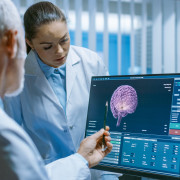- Science News
- Health
- Using neuroimaging techniques to predict psychosis in patients
Using neuroimaging techniques to predict psychosis in patients
Frontiers Science Hero: Stefan Borgwardt from Frontiers on Vimeo.
Professor Stefan Borgwardt has dedicated his research career to applying neuroimaging and cognition methods to psychiatry. As Professor of Neuropsychiatry at the University of Basel and as a head psychiatrist at the University Psychiatric Clinics (UPK) Basel, his understanding of both the research and clinical aspect of psychiatry makes him well-placed to tackle some of the challenges in this field.
Aiming to predict who will develop psychiatric symptoms
The cornerstone of Borgwardt’s work is using both structural and functional imaging techniques to be able to predict who will develop psychosis. The list of methods that his research group uses is impressive: from advanced neuroimaging techniques such as structural DTI to dynamic causal modelling, to multimodal imaging and imaging genetics.
“We have high risk subjects, or high risk patients, and by looking at MRI scans of their brains, we are able to predict who of these patients will later develop psychosis,” Borgwardt said.
The impact of the application of new imaging technology could be huge. “If you know who will develop a psychotic disorder, for instance, you could start treating earlier and that could possibly prevent psychiatric disorders,” Borgwardt explained. “That would be the biggest thing you could achieve as a scientist and as a doctor.”
There is still a way to go for this final aim, and Borgwardt says he is doubtful that we can reach it in the next 20 years. However, he says the research being conducted by his group and others is bringing us slowly closer.
Researching psychiatry to help people
Borgwardt’s reasons behind his dedication to the field of psychiatry are clear. “I like psychiatric patients and therefore I want to help them by providing better treatments and to understand their underlying problems… My main motivation as a doctor is to help patients and I use scientific methods to provide this help,” he said.
However it is not just the patients who will benefit from the advances provided by Borgwardt’s research. For people who develop psychosis, the knock-on effects can be devastating. They can suffer from hallucinations, delusions and ego disturbances all of which can result in the loss of their friends, family and jobs.
“If treatment of these patients could start earlier, for instance, by using neuroimaging techniques, that would help not only the patients; that would help the families and the whole of society,” he said.
Tackling challenges will be a collaborative effort
There are many challenges facing the field of psychiatry. Not just in research, but in the clinical applications of discoveries. “The last 20 years many neuroscience methods were developed such as genetics and neuroimaging. They all mainly dealt with groups of patients. But in clinical practice, we only deal with single patients. The most important and the most challenging issue for the next years will be to translate these research findings from groups of patients to single patients,” Borgwardt said.
These challenges are faster overcome in a research community which helps rather than hinders each other’s research. With that in mind, it is the interactive review process at Frontiers that stands out to Borgwardt. “I think the greatest thing about Frontiers in Psychiatry or about Frontiers in general is the collaborative work. It is how the review is done in Frontiers journals that is clearly different to other journals. I like the team spirit during this whole process.”
Since joining as a Specialty Chief Editor of Neuroimaging and Stimulation in March 2013, Borgwardt has stepped up to take on the role of Field Chief Editor for the open-access journal Frontiers in Psychiatry where he is responsible for 14 specialty sections and over 3,000 editors. In this position he hopes to advance the journal by attracting excellent research to the benefit of the entire field of psychiatry and the people affected by psychiatric disorders. He is currently co-editing a research topic entitled “Third-generation neuroimaging: translating research into clinical utility.” This research topic aims to bring psychiatric neuroimaging studies towards translational impacts in clinical practice, suggesting that brain abnormalities may be of potential use for detecting clinical outcomes as treatment response. He is looking for researchers to contribute manuscripts to this topic.
Pushing research forward
Besides predicting psychosis, Bordwardt is currently working on multiple research projects including exploring the brain – gut interaction and the effects of psychostimulants and heroin on the human brain. To learn more about Prof Borgwardt and his research you can check out his Loop profile or his striking Neuropsychiatry and Brain Imaging research group website.








